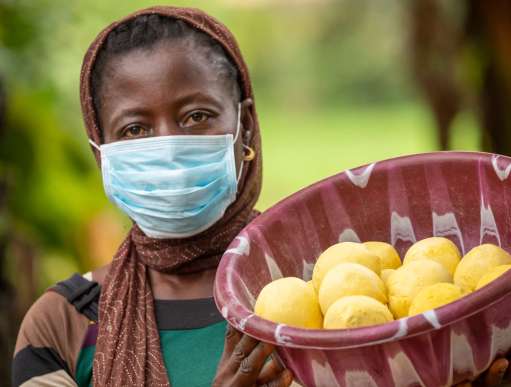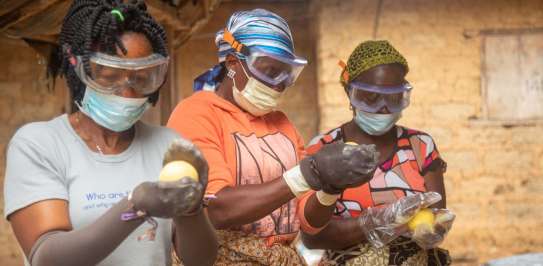While richer countries see the start of the roll-out of the coronavirus vaccine, it is estimated that 9 in 10 people in the poorest countries will not be vaccinated this year. This means that the humble bar of soap remains one of the best lines of defence against infection to prevent the spread of coronavirus in countries without strong healthcare systems able to provide ICU or ventilator care for those who fall ill.
Yet, more than 3 billion people across the world – 40% of the global population – don’t have soap and water in their homes, making it impossible for them to easily wash their hands, a practice key to helping people keep safe from the virus as well as prevent passing it on to others.
In Sierra Leone, the work of a group of women in the east of the country is helping to change this. The women have set up a soap-making business and are now able to produce and sell thousands of cheap bars of soap.
With support from Irish Aid, Christian Aid through its local partner SEND Sierra Leone has set up Community Health Insurance Schemes in the Kailahun district. These schemes are community savings and loan initiatives, allowing members to save money as well as borrow from this collective fund to meet emergency expenses. Loans are provided to members at a low-interest rate and when repaid, the interest accumulates in the scheme to ensure a pot of money is always available to be tapped into by members in need at a future date.
These savings and loan schemes are a lifeline for many people who otherwise wouldn't be able to afford the cost of medical emergencies. But the scheme has also allowed for members to use their loans to meet the costs of other important expenses such as to pay for school fees, the cost of transport to health facilities, to buy food and even setting up and invest in a business - further helping them to earn added income.
Image credits and information

We sell the soap within our community for only 1,000 Leones (the equivalent of 7 cents) so everyone is able to buy it. The use of soap really helps prevent the spread of the virus
Augusta is a teacher and the breadwinner in her family. She lives with her two grown-up children, 24-year-old Gibril and 22-year-old Fatmata, and her mother Aminata who is 65. Augusta is also a member of her local Health Insurance Scheme.
After receiving training sessions in soap making from SEND staff and after weeks of contributing savings to the scheme, Augusta together with 30 women from the scheme took out a loan in addition to investing their collective savings into setting up a soap-making business. The group have been producing soap since September 2020.
“We borrowed money from the Health Insurance Scheme to buy the items to make the soap. We buy all these items from the local market”, Augusta says.
All in all, the soap-making process takes two weeks to complete and the group are able to make 2,400 bars of soap each month, though like others, they weren’t exempt from the challenges that operating a business during a pandemic presents.
“Coronavirus is a concern for me. It was very difficult for us to gather together but with the help of face masks and psychical distancing, we have been able to resume making soap,” she says.
While Sierra Leone has only 3,236 confirmed cases of coronavirus, the true spread of the virus within communities is likely unknown due to a lack of testing. Like herself, Augusta explains that people in her community are worried about coronavirus because of the global scale of the crisis, but for her, her worry about the virus stems from having witnessed her own country contend with an Ebola epidemic in the past.
But amongst the worry and concern, Augusta thinks her group’s soap-making can really make a difference at a time when handwashing could mean the difference between good health and severe illness, and possibly even death.
“We sell the soap within our community for only 1,000 Leones (the equivalent of 7 cents) so everyone is able to buy it. The use of soap really helps prevent the spread of the virus,” she says.
In addition to this life-saving role, soap is also playing a key part in tackling poverty within the wider community. Each week, the women gather to make their savings contribution to the scheme using the income they earn from the sale of their soap and have begun to repay the loan they received from the scheme, helping to keep it self-sustaining and available for use by other members when they need it most.
As Augusta explains, bars of soap aren’t the only outcome to have emerged from the groups’ soap-making activities. It has also helped the group to branch out into other ventures and buy several acres of farmland to grow crops which they intend to harvest and sell to earn more money.
“While the coronavirus pandemic is a concern for me, it has empowered us to have savings,” she says. “As a group, we have also invested our savings into a groundnut and cassava farm,” she concludes.
Image credits and information

Christian Aid has been working in Sierra Leone since 1988 and since the civil war ended in 2002 have been focused on challenging systems that perpetuate poverty. Christian Aid Sierra Leone has been receiving funding from Irish Aid to strengthen opportunities for women and to boost their incomes, to help communities access improved health care and other basic services as well as reduce violence.
